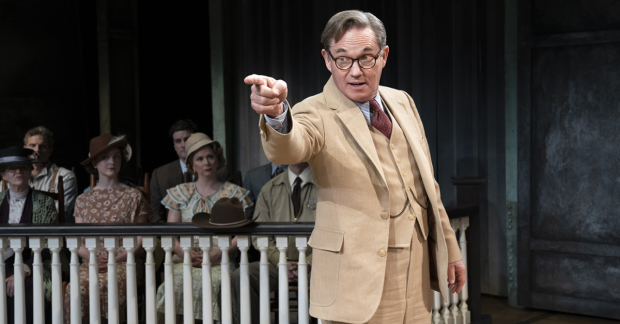REVIEW: Noble Sentiments Prevail Over Inconvenient Truths in To Kill a Mockingbird

(© Julieta Cervantes)
To Kill a Mockingbird exists in a world with decency at its center. It's easy to understand why Aaron Sorkin's adaptation of Harper Lee's classic novel blazed onto Broadway in 2018, becoming the most successful straight play of all time. It imagines a society where morality triumphs over prejudice, where the arc of the moral universe always bends toward justice.
This cockeyed optimism feels hollow in 2022, as Bartlett Sher's production begins its national tour amid mounting evidence to the contrary. Scenes from contemporary life, where incidents of racism and intolerance have become not only commonplace but brazen, more closely resemble Atticus Finch's admonition about the legacy of the Civil War: that it is bound to be "always yesterday." But theater never exists in a vacuum; it needs to meet the moment. And while this Mockingbird flew back into the public consciousness just four years ago, its message now seems both antiquated and simplistic.
Sorkin doubles down on the white saviorism of the source text — an attitude that Lee herself even disavowed in her prequel Go Set a Watchman, which was belatedly published in 2015. In the town of Maycomb, Alabama — where half the population claim membership in the Ku Klux Klan, but we're meant to believe that just as many are really pure of heart — Atticus (Richard Thomas) zealously defends Tom Robinson (Yaegel T. Welch) against the false charge of raping a white woman from one side of his mouth, while preaching tolerance and understanding for his malicious neighbors from the other. His adoring children, Scout (Melanie Moore) and Jem (Justin Mark), clock the potential hypocrisy in his posturing but ultimately swoon for his self-righteousness.
The blatantly racist characters — like Tom's accuser, Mayella Ewell (Arianna Gayle Stucki, who tries heroically to bring dimension to her role), and her vile father Bob (the comically malevolent Joey Collins) — are drawn in such broad caricature that they ultimately allow the viewer to transfer all their discomfort and disgust onto them, without ever questioning the complicity of the other white characters who function in a community that strenuously upholds a bigoted old order. Meanwhile, Black characters like Tom and Calpurnia (Jacqueline Williams), the Finch family's housekeeper, are relegated largely to positions of stoic dignity and only rarely granted the chance to speak in their own voices.
A viewer can still appreciate the crisp patter of Sorkin's dialogue, which sounds a lot like the familiar West Wing walk-and-talk with a twang, and many of the original staging's strongest elements still shine on tour. Adam Guettel's hauntingly doleful score, now prerecorded, creates a welcome contrast to the play's unflagging hopefulness. Miriam Buether's scenic design, where courtrooms and front porches seem to float amid the desolation of an abandoned warehouse, conjures grandeur and deterioration in the same breath. Jennifer Tipton's lighting design can be somewhat obvious at times — bathing Atticus in the bright light of truth and Bob Ewell in shadowy turpitude — but it makes for an arresting stage picture. The production has been scaled appropriately for oversize touring venues like the Academy of Music in Philadelphia, where I saw it.
Thomas is at his best when he lets Atticus's temper show, as when his cross-examination of Mayella Ewell devolves into a hostile grilling. But even an actor this fine cannot avoid the country lawyer hokum baked into the role. Moore, Mark, and Steven Lee Johnson — as the rambunctious Dill Harris, whom Lee based on her childhood friend Truman Capote — act as narrators from the present, looking back on their younger selves, but none of the trio strongly demarcate then from now. Still, there are admirable moments of teenage-boy bravado from Mark's headstrong Jem, and Johnson is genuinely moving when he lets Dill's mask of precociousness fall away.
Much has been made of casting Mary Badham, who earned an Oscar nomination at 10 for playing Scout in the 1962 film adaptation of Mockingbird, as Mrs. Henry DuBose, the bigoted, nasty neighbor who draws the ire of the Finch children. Her presence on the tour is intriguing from a historical standpoint, but she somehow manages to flatten an already one-dimensional role. Other cast members have greater success with small parts — none more so than Anthony Natale, a Deaf actor who speaks and signs, and brings a humane dignity to Link Deas, the town outcast with a surprisingly complex backstory.
To Kill a Mockingbird will continue to speak to certain audiences. On opening night in Philadelphia, the play's final line — "All rise" — seemed almost like a command to a standing ovation. But it was another line spoken near the end of the performance that struck me as more revealing. After the events of the trial and its aftermath have run their course, Atticus tells his children that "trying to do the right thing is the right thing." It's a noble sentiment, perhaps, but one that rings false in 2022. To simply try is no longer enough.










